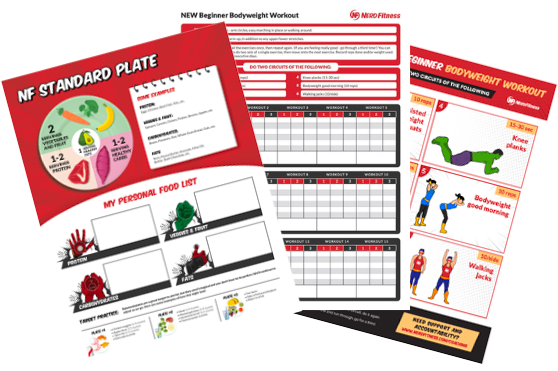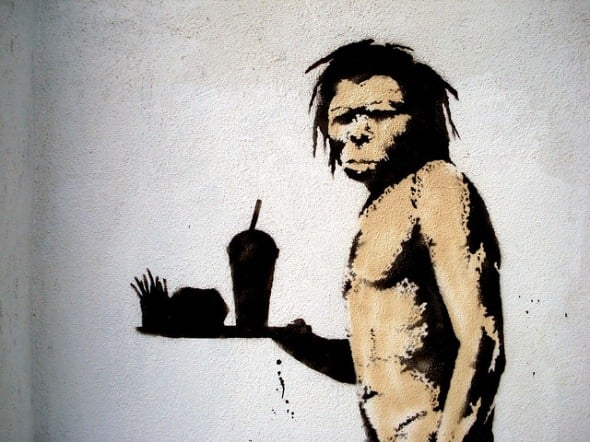
We’re big fans of the Paleo Diet around these parts.
If you’re not familiar with it, essentially it’s a ‘lifestyle choice’ of consuming certain foods based on we’re how we’re allegedly designed to eat from an evolutionary standpoint.
In short: cut out processed foods and grains, load up on veggies, meat, fish, eggs, fruits and nuts.
It’s no shock that Paleo is a hot topic around the Nerd Fitness Rebellion: our Beginner’s Guide to the Paleo Diet has been viewed over three million times.
Now, as this way of life has continued to grow in popularity, it seems like more and more critics are coming out of the woodwork to bash it and present arguments as to why the Paleo Diet is a fallacy.
Within the past few months, a TEDx talk on debunking the Paleo Diet has been making its way around the internet, and a recently released book, PaleoFantasy, has brought the “is this Paleo Diet a fad/dangerous/a waste of time?” to the front of the conversations throughout the blogosphere and mainstream media.
Being the nerd that I am, I wanted to respectfully address the most common arguments, explain my experiences with the diet, and then invite you to share your story too.
Let’s do this thing!
The Paleo Lifestyle isn’t realistic
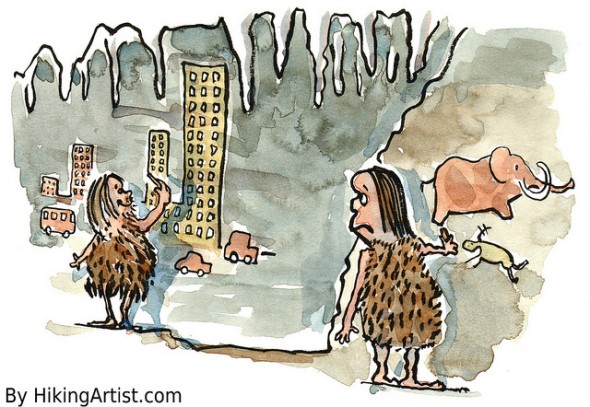
First and foremost, critics love to point out that literally living a Paleo lifestyle is impossible in this day and age.
If we’re going to eat like cavemen, then certainly we should want to be living like them as well, right? Strapping on loin cloths, hanging out in caves, foraging for our own food, hunting our own animals, giving up modern day luxury and moving back to a primitive lifestyle.
Here’s the truth: Nobody I know who follows Paleo principles actually wants to live that way! Yeah, we can’t go hunt wooly mammoths or gazelles, so we do the best we can by consuming grass fed beef or bison, free range chicken, wild fish, and so on.
It’s absolutely true that modern day food is different from the food that existed tens of thousands of years ago, so we do the best we can with what we have.
Ultimately, Paleo people aim to do the best we can to live like we’re genetically designed to live, while also having fun and enjoying the modern luxuries of today’s conveniences.
I love technology as much as the next nerd, and I have no intention on living in a cave any time soon. I’d certainly consider a hobbit hole, but for now I’ll stick with my apartment.
So, almost nobody takes the “Paleo Lifestyle” literally – it’s instead looked at as a simple blueprint to give us the best chance at having success with weight loss and optimal health.
How we eat isn’t the problem, it’s because we don’t move enough
 Currently, roughly 70% of the United States is overweight. Many health professionals assume that in order for us to turn our lives around, we simply need to be exercising more (at least 60-90 minutes per day) and eating less. Changing up our diet and abandoning food groups like “heart healthy” whole grains is a waste of time, and that we need to just focus on calorie deficits to lose weight and get things back under control.
Currently, roughly 70% of the United States is overweight. Many health professionals assume that in order for us to turn our lives around, we simply need to be exercising more (at least 60-90 minutes per day) and eating less. Changing up our diet and abandoning food groups like “heart healthy” whole grains is a waste of time, and that we need to just focus on calorie deficits to lose weight and get things back under control.
Unfortunately, in my research and studies on this topic I haven’t found this to tell the whole story: I firmly believe that our diet is responsible for 80-90% of our success or failure when it comes to weight loss or optimal health (exercise plays just a supporting role), that we CANNOT outrun our fork, and that all calories are NOT created equal.
I’ve found these articles found them both incredibly interesting and worth a read, explaining that just moving more isn’t enough, and that all calories are not created equal.
- A Tanzanian hunter-gatherer tribe was tracked over a series of months. Despite spending hours upon hours each day exercising, they showed no more energy expenditure than somebody who lived a far more sedentary lifestyle. This suggests that our bodies adjust to the stresses put upon them and adjust how we spend our energy accordingly; just moving more without changing our diet won’t result in long term success/health.
- Rats fed high fructose corn syrup gained significantly more weight than rats fed the same number of calories of table sugar. Not all sugar is created equal, and not all calories are created equal. Though, it’s not a stretch to believe that a 200 calorie Twinkie will not produce the same results in your body as 200 calories of broccoli.
The Paleo Diet is mainly meat based
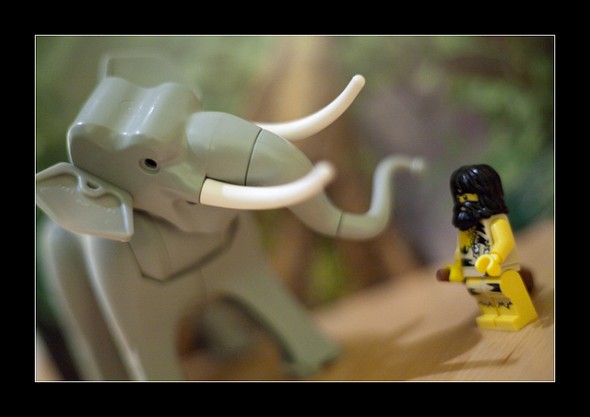
Most critics love to point out that the Paleo Diet is “mainly meat based” (as stated in the TEDx talk referenced above and in this Huffington Post piece). They then spend the rest of their talk/article explaining that we, in fact, didn’t eat all meat, and that we mostly ate plants!
And thank goodness! As the internet has recently pointed out, meat will kill you (actually, it won’t).
Although some people may choose to follow the Paleo Diet by eating primarily meat, and yes a majority of the protein consumed on a Paleo Diet does come from animal sources, I would argue that a true Paleo Diet is actually mostly vegetable based, supplemented by a protein source which often happens to be meat. So, the critics and advocates of the Paleo Diet are in agreement on this – mostly plants!
Paleo and Atkins are not synonyms. People that are all-in on a Paleo Diet tend to have 2/3rds of their plate filled up with vegetables, and a small portion of meat added. Yes, some people choose to eat more meat than that, but nowhere in the basic Paleo principles does it state that Paleo Diet is mainly meat based.
A diet that promotes the consumption of more vegetables, and whenever possible eating meat from pasture raised or free range animals?
Sounds like something we can all be in agreement on.
But ancient humans ate grains!

Here’s another argument that people love to point out:
Recently, some studies have popped up on various ancient cultures that show that some humans in certain civilizations consumed certain types of grains as far back as 100,000 years ago).
But wait! If the whole point of the Paleo Diet is that humans haven’t evolved much since the Agricultural Revolution (10,000 years ago)…and now you’re telling me that some humans ate grains further back than that, then how does the Paleo Diet make sense??
Shouldn’t this be causing mass hysteria among the paleo camp?
We’re missing the point here. The point is that processed grains, stuff in boxes and bags, is crap. No matter how far back you go in our evolutionary timeline, you’ll never find any ancient human eating dyed white bread or Lucky Charms (now with “heart healthy whole grains!”). We need to be focusing on eating unprocessed, real food.
THIS is the point. Not “no grains no matter what ever ever!” – but rather a common sense approach to cutting out processed foods and including more natural whole foods.
We are still evolving
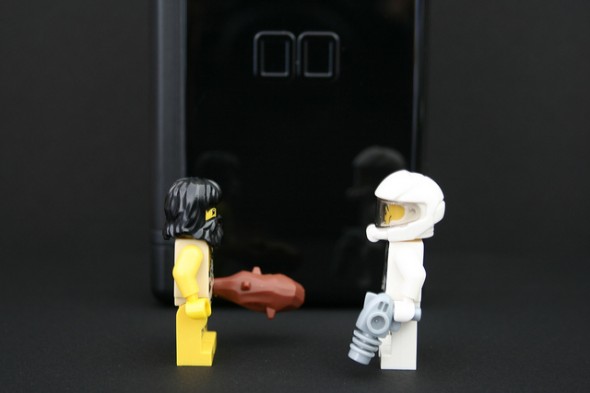
A big cornerstone of the Paleo Diet is that humans haven’t evolved drastically since the Agricultural Revolution occurred 10,000 years ago.
Critics argue that we have in fact evolved since then, and that certain cultures have adapted to be able to consume grains or dairy, proving that we are evolving and that the Paleo Diet is no longer valid.
Again, we’re missing the point here: I also believe that we are still evolving. For example, people of Northern European descent tend to have no problem consuming dairy, while people of Asian descent tend to have issues digesting lactose and are often lactose intolerant: it’s because humans have evolved over time to adapt to their surroundings!
The truth is, a lot of people ARE gluten intolerant or lactose intolerant. In fact, at least 65% of the population has “a reduced ability to digest lactose after infancy,” and a growing number of people are discovering they’re gluten intolerant.
So, the Paleo Diet helps make people aware of two food groups that many people tend to have an issue with. I don’t think it should come as a surprise then to realize that these are the two food groups introduced most recently into our diets from an evolutionary standpoint.
It would seem that although a portion of the population adapted to consume more starchy/carbohydrate rich diets, it’s far from being a majority; same goes for dairy consumption.
But this study shows that a _________ diet is better
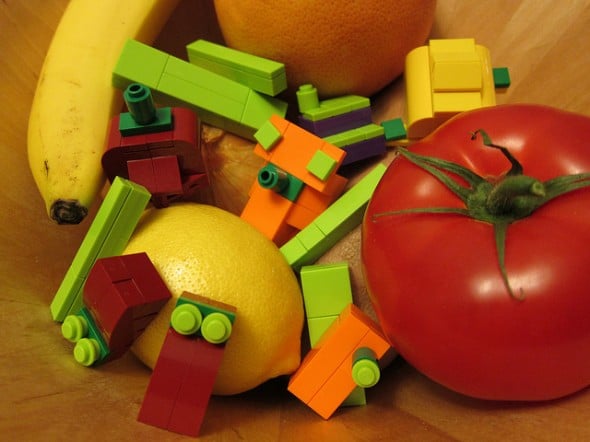
I tend to receive a few emails a week from concerned people who cite books like The China Study or other studies claiming that a plant only diet/low fat diet/fruit only diet/bicycle only diet is the path for optimal health, not Paleo.
To these, I reply: If it works for you, if you are getting a clean bill of health from your doctor, and if you are happy, by all means keep eating that way! It’s clearly working for you.
I don’t think there is one particular diet that works for everybody – we all have intolerances to certain things or proclivities to others. I WOULD argue that these studies always tend to mistake correlation for causation (as demonstrated by this refute of the China Study and its findings).
I encourage people to assume NOTHING, and to always wear skeptic goggles when reading studies.
Here’s an example: these studies often compare vegetarian lifestyles to regular people who say they consume meat. Somebody that has chosen to live a vegetarian lifestyle tends to be a more health conscious individual than the average bear, and thus aims to make healthier lifestyle choices all around (including exercise and eliminating certain types of unhealthy foods). This group of people is compared to people in the “meat consumption” category (everyone else), who may or may not want to be living a healthier life, who may not exercise, who may not eliminate certain foods, who may partake in other unhealthy activities, and so on.
The truth of the matter is that there are very few studies that compare a health conscious plant-only diet to a health conscious Paleo Diet (containing grass fed beef, organic chicken, organ meats, and lots and lots of vegetables).
If you are against the consumption of meat, more power to ya. If you look good, feel good, and wake up happy – keep doing what you’re doing, because it works for you.
However, if you are worried about consuming this or that due to a particular study, I would advise you to do your research on the study, create your own hypothesis, and conduct an experiment on yourself to find out what works for you!
Use these studies as a starting point for your own research.
Why I believe the Paleo Diet works
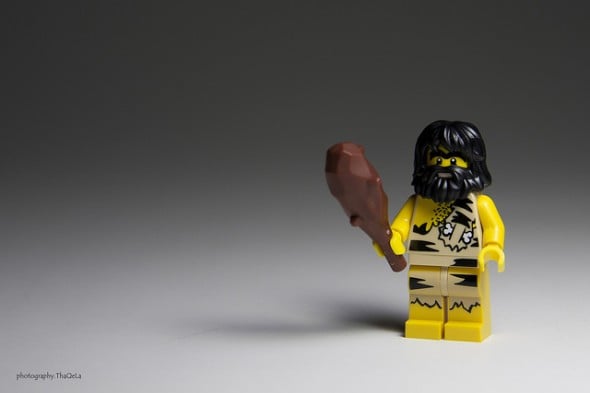
Here’s my humble, nerdy opinion as to why the Paleo Diet is so popular and helps so many people have success:
It’s not because ancient humans didn’t eat grains (they might have in small quantities); it’s not because we haven’t evolved (I’d argue that we have never stopped), nor because the diet encourages excessive meat consumption (if anything, it encourages excessive vegetable consumption). Heck, we can’t be exactly sure what people ate 100,000 years ago (until Doc gets the DeLorean up and running), but that honestly doesn’t matter.
I believe the Paleo Diet works for a number of reasons, the most important being something that has nothing to do with anthropology or physiology:
It’s not just because the Paleo Diet teaches your body to use stored fat for energy rather than sugar. Nor is it just because it’s very difficult to overeat on the Paleo Diet, which almost always leads to weight loss. It’s not just because it can help with things like diabetes and other physiological issues (like multiple sclerosis).
It’s because it’s damn simple to understand, makes logical sense, removes the need for counting calories, and removes willpower from the equation. Just like a workout, the pretty good routine you follow is better than the perfect one you don’t. Similarly, the Paleo Diet isn’t perfect, but it works for many and it’s easy to follow.
Here’s why: willpower is a finite resource.
How many times have you told yourself “I’ll just have one” or “okay, I’ll only eat half of this” before eating the entire box/bag/entire serving? Sugary/processed foods can have very addicting qualities, and for people who have addictive personalities (I’d imagine a HUGE portion of Nerd Fitness readers fit into this category), portion control can be incredibly challenging.
Having “just one” is a recipe for disaster, as your brain starts to think “ugh, why are you depriving me of this food that I so desperately want? I just tasted it and now I can’t think about anything else?!”
When you continue to consume unhealthy foods and you have this type of personality, you are a slave to your taste buds and the dopamine released after indulging yourself – your brain has a one-track mind and wants to consume the food you’re only allowed “one of.”
Compare this to somebody on the Paleo Diet. Instead of “I can’t eat that food,” you say “I don’t eat that food” (as it’s not on the list of approved Paleo foods). It has become part of your identity, and you need much less willpower to resist that temptation to consume (and most likely over-consume.
Thanks to my friend James Clear for this:
A research study divided people into two groups: one group was told that each time they were faced with a temptation, they would tell themselves “I can’t do X.” For example, when tempted with ice cream, they would say, “I can’t eat ice cream.” The second group was told to say “I don’t do X.” For example, when tempted with ice cream, they would say, “I don’t eat ice cream.”
As each student walked out of the room and handed in their answer sheet, they were offered a complimentary treat. The student could choose between a chocolate candy bar or a health bar. As the student walked away, the researcher would mark their snack choice on the answer sheet.
The students who told themselves “I can’t eat X” chose to eat the chocolate candy bar 61% of the time. Meanwhile, the students who told themselves “I don’t eat X” chose to eat the chocolate candy bars only 36% of the time. This simple change in terminology significantly improved the odds that each person would make a more healthy food choice.
By removing the mental work from the equation, the Paleo Diet puts you back in control, takes out the guess work required to figure out how much exactly to eat, and eliminates the temptation associated with only having ‘a few’ of something.
The Paleo Diet works because the procedure is easy to follow and to build as a habit…not because it gives away some super secret diet formula…but because it’s simple and thus easy to adhere to.
Do I follow the Paleo Diet?

Although I’m a big fan of the Paleo Diet, I make a conscious decision to not follow it 100%.
Instead, I have adapted the Paleo principles to my life and altered them to fit my lifestyle and goals.
Here’s why: setting aside the fact that there is no one true “Paleo Diet,” whenever I go full Paleo I tend to lose weight very quickly, dropping my body fat percentage down into the 7-8% range. Personally, my goals these days are to add size and muscle, and improve my athletic performance. In order for me to do that, I need to be putting ON weight, so I will mix in some non-Paleo foods like whole milk, rice, and oats depending on my training routine for that day.
On top of that, I’ll occasionally eat unhealthy foods, generally around social events, and not think twice about it! Although it’s possible to eat healthy at a barbecue, I choose not worry about it, drink beer and eat pizza with everybody else, and then get back on track with my next meal.
So, although I don’t follow the Paleo Diet 100%, I’d argue that this is yet another example that shows that it works – when I want to put on weight, I add back in grains and dairy to my diet. When I go full Paleo, I lose body fat quickly and get even more lean, which is the same way Saint got his results after years of struggle. I know NF Team member Staci is the same way: she constantly adjusts her Paleo “percentage” based on her athletic goals at that time. We call this “Paleo-ish“.
The best solution?

I’ll be expanding upon this topic in a future article, but these are the rules that I believe will help you have the most success with weight loss, a healthy checkup from the doctor, and happy life:
- EAT REAL FOOD. The less ingredients, the less steps it took to process, the healthier it will most likely be for you.
- Minimize consumption of grains and dairy if your goal is weight loss. Consider eliminating foods completely and then add them back in after a few weeks to see how your body responds.
- Understand that you can’t outrun your fork. Your diet will account for 80% of your success or failure.
- Eat more vegetables. No, corn doesn’t count 🙂
- Try to consume 1 gram of protein per pound of lean body weight each day.
- Minimize liquid calories.
- Don’t have cheat meals – instead, make conscious decisions when to eat ‘unhealthy foods’ and then get right back on track.
- Focus on building permanent small changes rather than sweeping changes that only last for a few weeks.
- Relax! Do the best you can with what you have, where you are.
We’ve put together a “Nerd Fitness Diet”, based on these principles, which you can find in the Nerd Fitness Academy. It’s our combination of paleo, making long term lifestyle changes, and instead of a rigid set of yes’s and no’s, it’s a simple set of guidelines to live by.
Have you tried it?
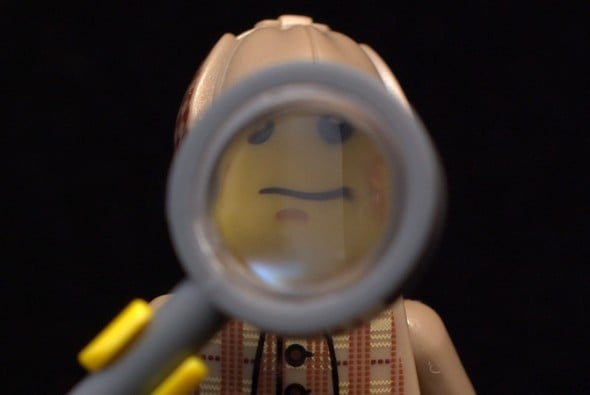
I often find that those who are overly critical of the Paleo Diet have never actually given it a shot, nor tested for themselves how their body responds to these changes.
I encourage EVERYBODY to think for themselves and question everything – it’s even one of the Rules of the Rebellion! I also encourage everybody to understand how their body works by getting hard facts whenever possible. Take the time, save up the few bucks required, and get your blood work done. Then change your diet for 30-60 days and get blood work done again. See how your body reacts!
Not interested in getting blood work done? Then go with look and feel – spend 30 days trying out a new diet, take before/after pictures and measurements, and compare how you feel (energy levels, exhaustion, etc.) before drawing your own conclusions.
I’d love to hear from you:
What are your thoughts on the Paleo Diet?
Have you tried it? What were your results?
If you’re against it, what are your concerns?
Leave a comment and let’s get the conversation started! As always, thanks for keeping things civil 🙂
-Steve
PS – If you are interested in the Paleo Diet and want more information, check out our Beginner’s Guide to the Paleo Diet which links to a number of great resources. If you want even more direction, our Nerd Fitness Academy diet is grounded in Paleo principles, applied in a way that you can slowly make changes rather than going all in. Cheers!
###
photos: caveman fast food, caveman wall painting, cat on treadmill, wooly mammoth, wheat, caveman spaceman, lego veggies, solo caveman, steak and asparagus, lego sherlock.


